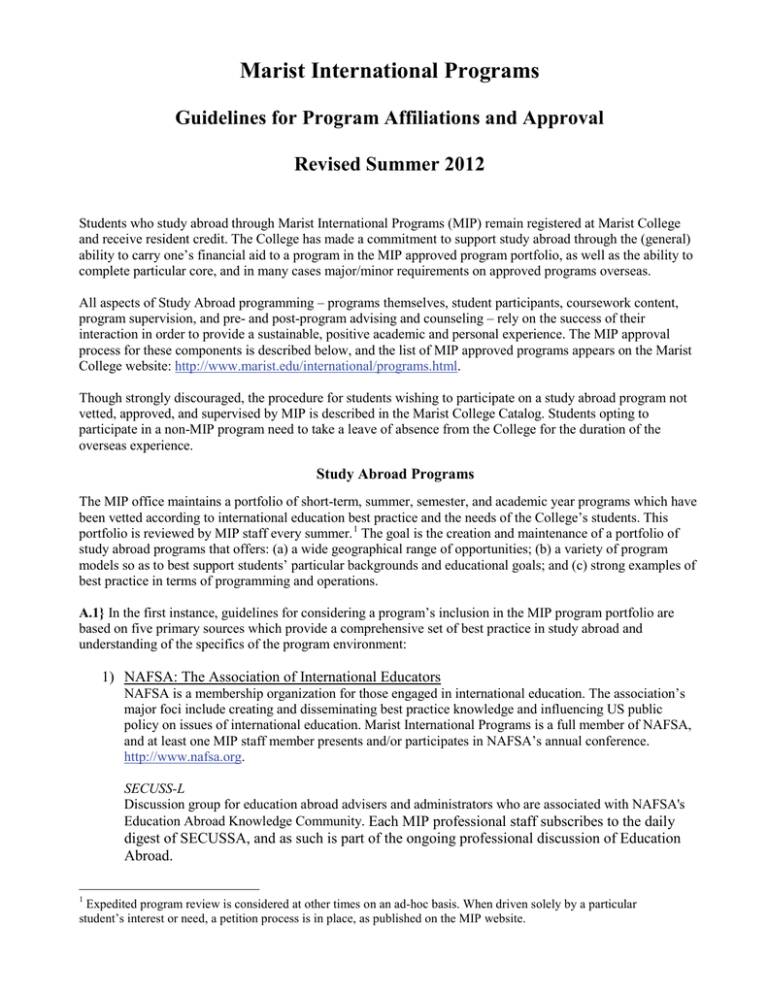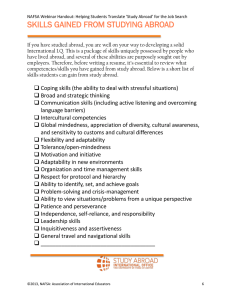Marist International Programs Guidelines for Program Affiliations and Approval Revised Summer 2012
advertisement

Marist International Programs Guidelines for Program Affiliations and Approval Revised Summer 2012 Students who study abroad through Marist International Programs (MIP) remain registered at Marist College and receive resident credit. The College has made a commitment to support study abroad through the (general) ability to carry one’s financial aid to a program in the MIP approved program portfolio, as well as the ability to complete particular core, and in many cases major/minor requirements on approved programs overseas. All aspects of Study Abroad programming – programs themselves, student participants, coursework content, program supervision, and pre- and post-program advising and counseling – rely on the success of their interaction in order to provide a sustainable, positive academic and personal experience. The MIP approval process for these components is described below, and the list of MIP approved programs appears on the Marist College website: http://www.marist.edu/international/programs.html. Though strongly discouraged, the procedure for students wishing to participate on a study abroad program not vetted, approved, and supervised by MIP is described in the Marist College Catalog. Students opting to participate in a non-MIP program need to take a leave of absence from the College for the duration of the overseas experience. Study Abroad Programs The MIP office maintains a portfolio of short-term, summer, semester, and academic year programs which have been vetted according to international education best practice and the needs of the College’s students. This portfolio is reviewed by MIP staff every summer. 1 The goal is the creation and maintenance of a portfolio of study abroad programs that offers: (a) a wide geographical range of opportunities; (b) a variety of program models so as to best support students’ particular backgrounds and educational goals; and (c) strong examples of best practice in terms of programming and operations. A.1} In the first instance, guidelines for considering a program’s inclusion in the MIP program portfolio are based on five primary sources which provide a comprehensive set of best practice in study abroad and understanding of the specifics of the program environment: 1) NAFSA: The Association of International Educators NAFSA is a membership organization for those engaged in international education. The association’s major foci include creating and disseminating best practice knowledge and influencing US public policy on issues of international education. Marist International Programs is a full member of NAFSA, and at least one MIP staff member presents and/or participates in NAFSA’s annual conference. http://www.nafsa.org. SECUSS-L Discussion group for education abroad advisers and administrators who are associated with NAFSA's Education Abroad Knowledge Community. Each MIP professional staff subscribes to the daily digest of SECUSSA, and as such is part of the ongoing professional discussion of Education Abroad. 1 Expedited program review is considered at other times on an ad-hoc basis. When driven solely by a particular student’s interest or need, a petition process is in place, as published on the MIP website. 2) The Forum on Education Abroad The Forum on Education Abroad is the official (and only) Standards Development Organization (SDO) recognized by the Federal Trade Commission for Education Abroad. A membership organization which includes educational institutions, consortia, agencies, and organizations, as well as individual leaders in the field, The Forum has established standards of good practice to improve study abroad curricula, promote data collection and outcomes assessment, and advocate for high quality education abroad programs. The Standards of Good Practice for Education Abroad is regarded as the gold standard in the field of Education Abroad. Marist International Programs is a full member of The Forum. A copy of the most recent Standards can be found here: http://www.forumea.org/documents/ForumEAStandardsGoodPractice2011-4thEdition.pdf. Please note that every MIP-approved study abroad program/organization is a membe/subscriber of either NAFSA, Forum, or both of these organizations. 3) Overseas Security Advisory Council (OSAC) OSAC is a Federal Advisory Committee which currently encompasses a Core Council, an Executive Office, over 100 Country Councils, and more than 3,500 constituent member organizations. It is the focal point for the exchange of unclassified information between the US Department of State and the private sector on security-related incidents and threats overseas, including the posting of DOS Travel Warnings and Public Announcements. The OSAC website https://www.osac.gov/ offers critical incident reporting and specific traveler information. Marist International Programs staff receives OSAC’s daily morning newsletter and afternoon digest, and ongoing review of OSAC reports and data allow MIP to stay informed of security developments. 4) Council on International Educational Exchange (CIEE) CIEE is an academic consortium of over 150 U.S. public colleges and universities administering over 100 study abroad programs in 35 host countries. The Academic Consortium, represented by the Academic Consortium Board, oversees all of the CIEE Study Centers by conducting periodic evaluations of the programs and reporting its findings to the Consortium. CIEE hosts an annual Conference where best practice in education abroad is discussed, debated, and articulated. CIEE publications offer frameworks for best practice study abroad administration. Marist International Programs is a full member of CIEE. http://www.ciee.org/study-abroad/academic-consortium/ 5) MIP Office Staff The full time staff of four professional international education administrators have spent considerable time living and working abroad, in addition to the management of, and participation in, study abroad programming. Regional expertise includes Europe, Asia and the Pacific, Africa, and the Americas. MIP professional staff, at times alone and other times teamed with a Marist Academic Dean, Chair, or faculty member, visit programs from the MIP portfolio of approved programs, for program review and familiarization purposes. These site visits allow Marist International Programs to properly supervise the portfolio of approved programs and to make changes therein when deemed appropriate. B.1} In the second level of consideration, there are a range of issues which involve a combination of academic and operational benchmarks that specifically inform ongoing refinement of the approved programs list. In general, the academic quality of programs is determined by home-country and/or U.S. accreditation, breadth and depth of the curriculum available to visiting students, appropriate language instruction, and reputation among peer academic and study abroad departments. For academics the main points MIP staff consider include: • • Type of program, i.e. direct enroll, island, hybrid, faculty-led /departmental Academic accreditation in the host country and/or the US (“School of Record”) • • • • • • • • • • • • Academic merit, e.g. number of contact hours per credit Evidence of teaching expertise and experience Host site facilities conducive to academic advancement Field study, community-based learning, or volunteer/community service components Institution where classes are held Language of instruction Clearly defined prerequisites If applicable, determination of foreign language level and how it fits into the sequence of the Marist curriculum Formal academic evaluation procedures Quality of faculty and administrative relationships Official transcript/grade report Returning-student evaluations and site visit feedback B.2} Co-equal at the second level is the operational side, where program approval is generally based upon precedent, past experience, personal experience, and/or administrative knowledge, the depth and breadth of student services, consistent safety and risk management policies and implementation on site, and staff site visits. For operations the main points Marist staff consider include: • • • • • • • • • • • • • • • • Review of the safety and risk management environment Timing of academic calendar in program country Duration of program Eligibility requirements Orientation on-site Residential director or program office on site Demonstrable intercultural experience High level of cultural immersion (structured contact with local community). This is particularly important in English-speaking countries Cultural exposure determined in part by the locale and the proportion of home-country students, non-US students, and US students in the program Interaction with student peers Number of students participating on program and if they are primarily from U.S. universities MIP staff workload as related to number of expected enrollments over time Student services Living facilities Where meals will be provided Returning-student evaluations and site visit feedback





